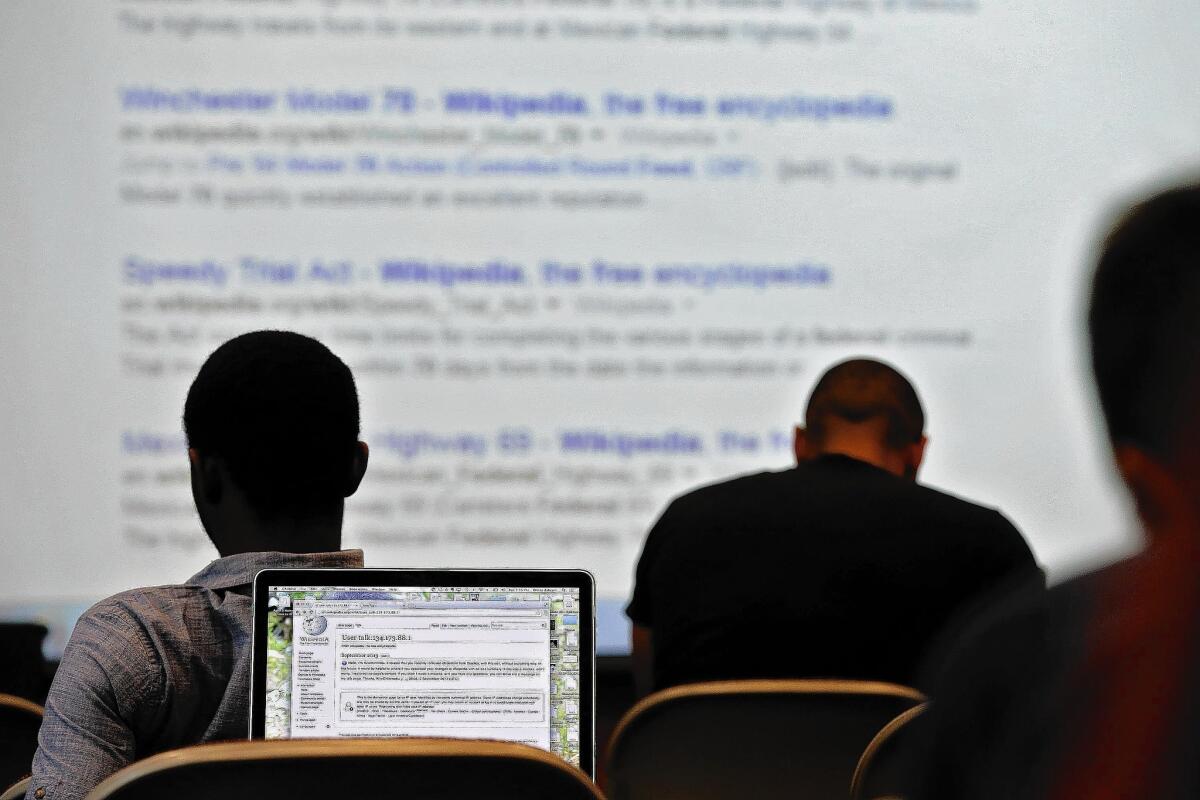Why some college professors are telling students to use Wikipedia for class

Most college freshmen learn on Day 1 that they shouldn’t use Wikipedia. It’s framed as a crime on par with cheating: a mortal sin against the gods of academia.
In hundreds of classrooms across the country, though, some professors have begun taking a very different tack. Not only are their students encouraged to see Wikipedia as an important information source, but they’re required to edit it for class assignments.
For the record:
12:30 p.m. June 21, 2016An earlier version of this article misstated the name of the Wiki Education Foundation as the Wikipedia Education Foundation.
Students at Emerson College, for instance, are responsible for Wikipedia’s “theatre and disability” page. The encyclopedia article on minor depressive disorder was revamped by a student at North Dakota State University. And if you ever look up the Wikipedia page on vaccination policy — a hot topic in our current political climate — most of what you’re reading sources from a sophomore-level chemistry class at the University of Michigan.
In sum, more than 14,000 students have created or edited 35,000 Wikipedia articles as part of a program run by the Wiki Education Foundation. The three-year-old nonprofit, a spin-off of the Wikimedia Foundation funded in part by the Stanton Foundation and Google, is determined to convince professors and students that — counter to everything they have ever been told — Wikipedia actually belongs in schools.
“It’s so much better than a term paper, from a student’s perspective,” said Susan Alberts, a biology professor at Duke University who has used Wikipedia in her classroom for the last five years. “This way, when students write something, someone besides their teacher actually reads it.”
As Alberts’ experience suggests, the idea of students editing Wikipedia is not entirely novel. But Wiki Ed, which has grown exponentially in the last three years, has developed a program that makes it easier for new classrooms to join up and for hundreds of classes to participate at once.
The organization takes care of training students on Wikipedia’s obtuse cultural norms and retro editing interface. After that, it works with professors to oversee students as they draft, edit and submit articles, often over several weeks.
In Alberts’ behavioral ecology classroom, students are invited to pick their favorite topic off a pre-selected list of biology articles that Wikipedia has said it needs, which they will spend the semester drafting and revising. When they are ready to make their changes to the live Wikipedia article, a hardened Wikipedian is on call to help them.
See the most-read stories in Business this hour >>
To date, students in Alberts’ class are responsible for adding about 26,600 words to articles on behavioral ecology, including large portions of the articles on the endurance running hypothesis and vocal learning. If you Google either of those topics today, Wikipedia is the first result: Both articles are lengthy, thorough and immaculately sourced to a range of symposiums and journals.
This, says Eryk Salvaggio, Wiki Ed’s spokesman, is the real benefit of the program: It’s not merely a pedagogical tool but a way to liberate knowledge from journals with paywalls and college classrooms and ferry it to the Internet public.
According to a May 2016 Knight Foundation survey on mobile-phone use, Wikipedia is a more significant destination for news and information, in terms of monthly audience reach, than CNN, the New York Times, the Washington Post, USA Today and BuzzFeed. Yet many of the people writing these highly trafficked, influential pages have less access to the latest academic literature than your average college freshman taking an introduction to biology course.
“The benefits go way beyond the student,” Salvaggio said. “It’s learning in concentric circles that improves the public’s understanding.”
Wiki Ed is working on a special project this year: Since the fall, the program has been focused on science, math and engineering, areas in which coverage tends to be spotty. During the spring term alone, Wiki Ed estimates student edits have been seen by an audience in the 58-million range.
“As a communications exercise, it works,” Alberts said. “Where else is student work going to have that kind of impact?”
Caitlin Dewey writes for the Washington Post.
ALSO
Joe Biden to target Donald Trump on foreign policy
Are the media complicit in mass shootings?






